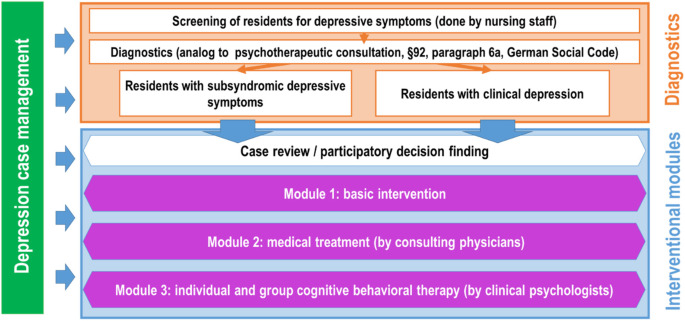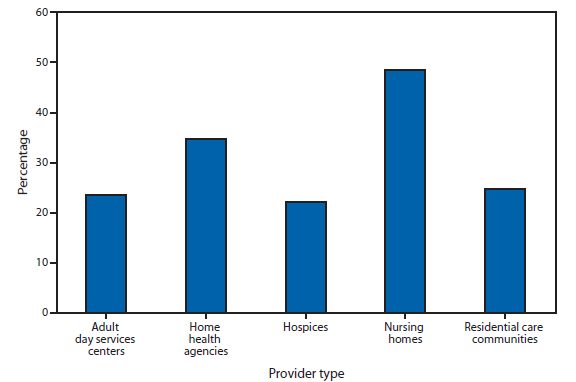Depression in nursing homes is a very serious issue that affects thousands of elderly residents every year. It is often overlooked and untreated due to the lack of understanding within the community surrounding nursing home settings. Not only does depression impact the physical and mental health of individuals, but it also has profound effects on the emotional wellbeing of those living in nursing homes.

Table Of Content:
- Depression in nursing homes: prevalence, recognition, and treatment
- Risk of Depression in Nursing Homes
- A Doctor's View: Depression in Long-Term Care Residents
- Depression in the nursing home: a cluster-randomized stepped ...
- QuickStats: Percentage of Users* of Long-Term Care Services with a ...
- Does Moving to a Nursing Home Cause Depression? - AgingCare ...
- Treatment of Depression in Nursing Home Residents without ...
- The Forgotten Psychopathology of Depressed Long-Term Care ...
- BE-ACTIV for Depression in Nursing Homes: Primary Outcomes of a ...
- Reducing depression in nursing homes requires more than just ...
1. Depression in nursing homes: prevalence, recognition, and treatment
https://pubmed.ncbi.nlm.nih.gov/20391857/ Conclusions: Findings show that depression is relatively frequent in residents of nursing homes. Moreover, it is insufficiently recognized by physicians and is ...
Conclusions: Findings show that depression is relatively frequent in residents of nursing homes. Moreover, it is insufficiently recognized by physicians and is ...
2. Risk of Depression in Nursing Homes
https://www.nursinghomeabusecenter.com/blog/risk-depression-nursing-homes/ Jun 1, 2019 ... Seniors need mental health care. Nursing home residents may be at risk of developing depression, or of their current mental health issues ...
Jun 1, 2019 ... Seniors need mental health care. Nursing home residents may be at risk of developing depression, or of their current mental health issues ...
3. A Doctor's View: Depression in Long-Term Care Residents
https://www.chausa.org/publications/health-progress/article/november-december-2014/a-doctor%27s-view-depression-in-long-term-care-residents
Approximately 20 percent of all nursing home residents have major depression (about 350,000 people in the U.S.), and an additional 30 percent have significant ...
4. Depression in the nursing home: a cluster-randomized stepped ...
https://trialsjournal.biomedcentral.com/articles/10.1186/s13063-019-3534-x Jul 11, 2019 ... Depression is the second most common psychiatric illness in old people. Up to 30% of nursing home residents have minor or major depression.
Jul 11, 2019 ... Depression is the second most common psychiatric illness in old people. Up to 30% of nursing home residents have minor or major depression.
5. QuickStats: Percentage of Users* of Long-Term Care Services with a ...
https://www.cdc.gov/mmwr/preview/mmwrhtml/mm6304a7.htm Jan 31, 2014 ... The percentage of users with a diagnosis of depression in nursing homes (49%) was approximately twice that of those in adult day services ...
Jan 31, 2014 ... The percentage of users with a diagnosis of depression in nursing homes (49%) was approximately twice that of those in adult day services ...
6. Does Moving to a Nursing Home Cause Depression? - AgingCare ...
https://www.agingcare.com/articles/nursing-home-depression-147347.htm![]() According to the American Geriatrics Society, such a monumental change can lead to depression, ranging from mild to chronic, in approximately 40 percent of ...
According to the American Geriatrics Society, such a monumental change can lead to depression, ranging from mild to chronic, in approximately 40 percent of ...
7. Treatment of Depression in Nursing Home Residents without ...
https://www.ncbi.nlm.nih.gov/pmc/articles/PMC5469363/ Oct 19, 2016 ... Depression in nursing facilities is widespread and has been historically under-recognized and inadequately treated. Many interventions have ...
Oct 19, 2016 ... Depression in nursing facilities is widespread and has been historically under-recognized and inadequately treated. Many interventions have ...
8. The Forgotten Psychopathology of Depressed Long-Term Care ...
https://www.karger.com/Article/FullText/514118 Depression is an extremely widespread psychiatric disorder in nursing homes; it has a negative impact on the quality of life and affects more than one fifth of ...
Depression is an extremely widespread psychiatric disorder in nursing homes; it has a negative impact on the quality of life and affects more than one fifth of ...
9. BE-ACTIV for Depression in Nursing Homes: Primary Outcomes of a ...
https://www.ncbi.nlm.nih.gov/pmc/articles/PMC4342721/ Apr 1, 2014 ... Twenty-three nursing homes randomized to BE-ACTIV or treatment as usual (TAU); 82 depressed long-term care residents recruited from these ...
Apr 1, 2014 ... Twenty-three nursing homes randomized to BE-ACTIV or treatment as usual (TAU); 82 depressed long-term care residents recruited from these ...
10. Reducing depression in nursing homes requires more than just ...
https://theconversation.com/reducing-depression-in-nursing-homes-requires-more-than-just-antidepressants-38970 Jul 27, 2015 ... More than half (52%) of aged care residents have symptoms of depression, compared with 10-15% of older people living in the community.
Jul 27, 2015 ... More than half (52%) of aged care residents have symptoms of depression, compared with 10-15% of older people living in the community.
What are the common signs and symptoms of depression in nursing homes?
Common signs and symptoms of depression in nursing homes include feeling sad or hopeless, difficulty concentrating, irritability or aggression, self-harm, withdrawal from activities or social situations, loss of interest in daily activities or hobbies, changes in sleeping habits (either insomnia or oversleeping), unexplained physical issues such as headaches or stomachaches, changes in appetite, fatigue/low energy, feelings of guilt or worthlessness.
What can we do to help reduce depression among nursing home residents?
There are several things that can be done to help reduce depression among older adults living in nursing homes. Building meaningful relationships with family members and staff is important to ensure that residents feel cared for and supported. Additionally, providing access to meaningful activities that promote positive interactions and engagement can also help individuals stay socially connected. Furthermore, setting up individual plans tailored for each resident to address their specific needs allows them to feel more heard and empowered by their care team. Lastly, establishing comfortable living spaces with plenty of natural light can also positively contribute to older adults’ moods and overall wellbeing.
How does depression affect aged care facilities?
Depression among residents can have many negative impacts on aged care facilities such as increasing medical costs due to longer hospital stays for depressive episodes; lowered morale due to sadness spilling over into other areas such as employee performance; an increased risk for physical ailments due to lower quality nutrition; increased absenteeism due to caregivers taking time off; reduced communication between staff members due to tension caused by difficult conversations around mental illness; and a decreased sense of community leading family members feeling disconnected from their loved ones who live at the facility.
Conclusion:
Depression is a serious issue facing many elderly residents living in aged care facilities across the world. While it may not always be easy to spot signs and symptoms of depression among these individuals, there are still important steps we can take as a society towards helping reduce its prevalence within these settings. With proper training for staff members combined with thoughtful planning from families and friends of those living in aged care facilities everyone can play an important role towards improving quality of life together.
